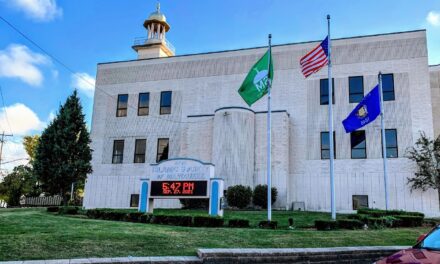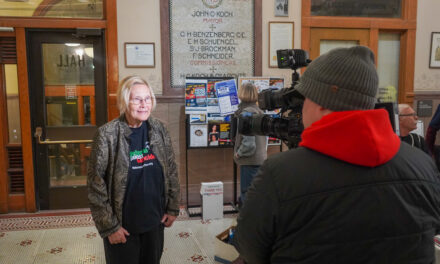While the rest of us are sheltering at home, hundreds of Muslim physicians and nurses in Wisconsin are on the frontlines of the war against corona virus. Currently, there are at least three known cases of doctors who have tested positive
While the situation remains grim, the story from the frontlines in metro Milwaukee, Wisconsin’s hardest hit area, is one of preparedness, caring, and courage.
Dr. Abbas Ali is a pulmonary (lung) and critical care specialist who works at both a hospital in Milwaukee’s Sherman Park neighborhood as well as one in a northern suburb.* Pulmonary specialists are the shock troops of this pandemic. Dr. Ali, who said he has been “available 24-7 during the crisis,” confirmed that in the second and third weeks of March “there was a sudden surge” at the hospital located in Sherman Park, one of the neighborhoods hardest hit by the corona virus.
“The hospital was very well-prepared for the increased patient load,” Dr. Ali said. The hospital established a medical floor where Covid-19 patients who were not critical were quarantined. For the staff, “it was the first experience tackling this type of disease and there was a lot of uncertainty and apprehension,” he said.
As more patients began to be put on ventilators, “the challenge was to put them on a machine without contaminating the room with aerosols and exposing the staff.” (Aerosols are created when mucus is converted into tiny particles that are carried on the air). For medical staff treating their first Covid-19 patients “there were so many questions about the disease, but even during that moment of crisis, I saw the staff was protecting each other and reminding each other how to be safe in the room.”
Dr. Ali said the hospital maintained “a skeleton staff” inside patient rooms. “We walked into the patient’s room with the gown, gloves, goggles, head covering, and necessary equipment. We focused on conserving because we were not sure what the patient load was going to be.” Dr. Ali said this “gave me a lot of confidence – everyone was focused on conserving and saving essential medical supplies as much as possible.”
He praised the courage and resourcefulness of hospital staff, saying that they were “put under so much stress that they worried about their own lives, and even in that moment, everyone was so nice and protective of each other.”
The doctor also praised the hospital staff for thinking on their feet. For example “covering certain outlets on the machine with a special valve to prevent aerosolization.”
After their first or second experience working with Covid-19 patients in the ICU “we had so much confidence in the team that it reinforced the willingness to take the risk” despite the fact that initially, staff entered those rooms “without knowing what was going to happen inside.”
The hospital also “provided a team to decontaminate us and gown us and witness that we had put on all the protective gear and that when we left the patient’s room, the decontamination process was followed. That was a great help.”
Those staff members outside the room “were from other departments” with little previous experience with critical patients and “even they were able to help us at this time.” Dr. Ali praised staff at all levels for “the level of sacrifice and the level of compassion and the level of care for other team members as well as the patient.” He told of a housekeeping worker who stopped what she was doing to disinfect the doctors lounge doorknob for him, a dietary worker who put his name on sandwiches made according to his dietary restrictions, the respiratory therapist who gave the doctor his goggles while they were both working with a patient. This level of compassion and teamwork, Dr. Ali said, is “unlike anything” he has ever experienced working in healthcare.
But then, so is the corona virus pandemic.

Dr. Raed Hamed, Pulmonologist and director of the ICU at Aurora Sinai

Dr. Abbas Ali, Pulmonary and critical care specialist

Dr. Dima Adl, Pulmonary, Critical Care & Sleep Medicine Physician
More than half of all Covid-19 cases in Wisconsin are from Milwaukee County, and the downtown neighborhood around Aurora Sinai Medical Center is another hard-hit area, said Dr. Raed Hamed, a pulmonologist and director of the ICU at Aurora Sinai. “We were ahead of the curve on the surge that took place in Wisconsin. We have been using 60-70 percent of our capacity,” Dr. Hamed said. “We took care of everyone who needed to be in the ICU and on the floor.”
The experience of New York City provided a warning for the Milwaukee area. “We knew that this was going to come to us, so hospital administration was really great in providing the support,” Dr. Hamed said. “They really did understand that we needed to be prepared.”
Dr. Hamed said that because of this preparation, the Milwaukee area has not experienced the shortages of PPE supplies “that have been seen on a national level.” Aurora Sinai’s administration urged staff to “be smart” about the way it makes use of PPE supplies, Dr. Hamed said. “We haven’t gone through any time of day when we don’t have them” and no physician or nurse was left without protection or with inadequate protection, he said.
“It’s a tough journey that we have to take together,” Dr. Hamed said. “But the resources were put on the table to make sure we have adequate staff and that people were safe. In our system specifically, we were able to provide the care that patients need.”
Still, the virus has taken its toll, particularly on the family lives of those on the frontlines, said Dr. Dima Adl. “Driving back to the hospital again in the middle of the night, leaving the kids alone, is happening more often,” Dr. Adl said, and “of course the family is worried about the health of the physician.”
Perhaps the best thing the community can do to aid healthcare workers at this time is to continue to obey the governor’s order to shelter at home. Nisreen Atta, an R.N. who works in the emergency room of a large southside hospital, reminds WMJ readers that “all we can do locally is prepare ourselves, our family members, and really abide by the laws, understanding why the safer-at-home order is in place – not to restrict movement or even freedom, but for the safety of every single one of us. We need to stay in our homes and not go out and socialize. The less contact we have, the less likely the corona virus is spread.”
*Where WMJ omitted the names of hospitals in this story, it was at the request of those interviewed.















